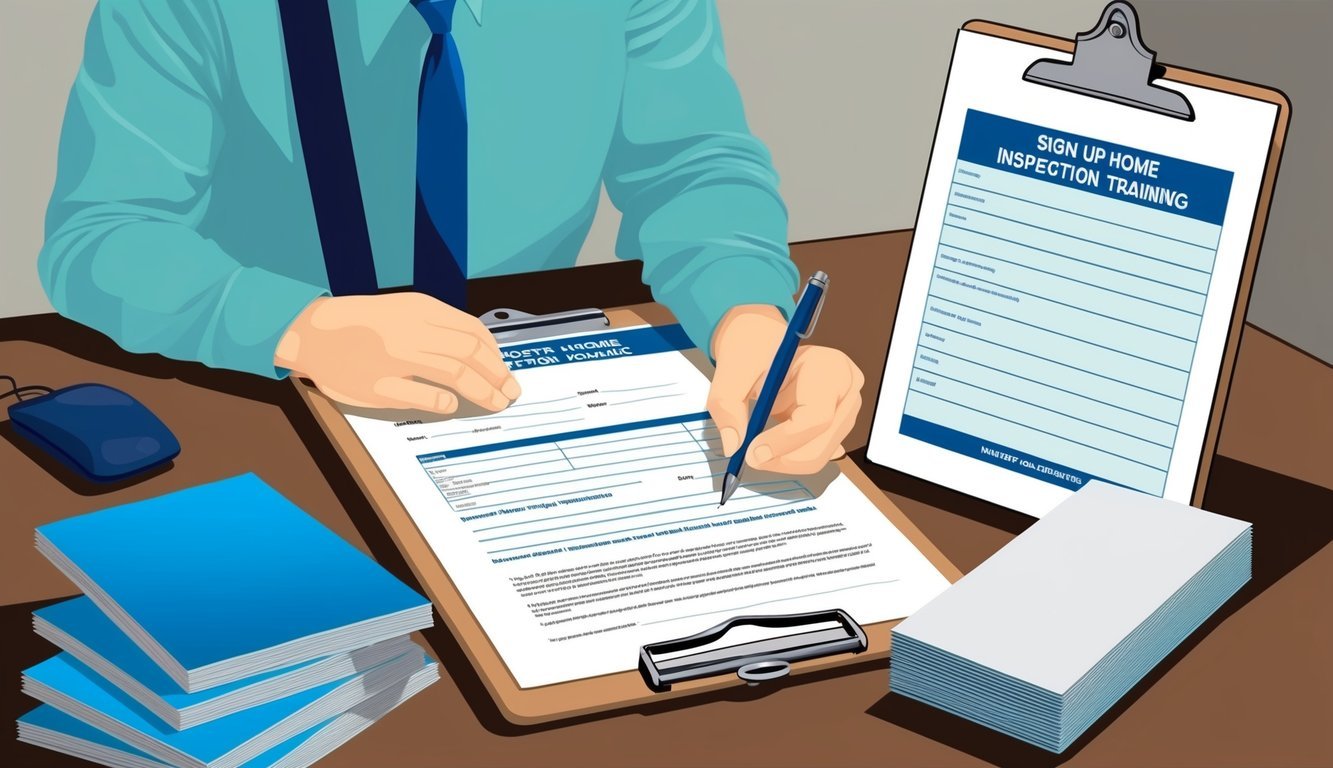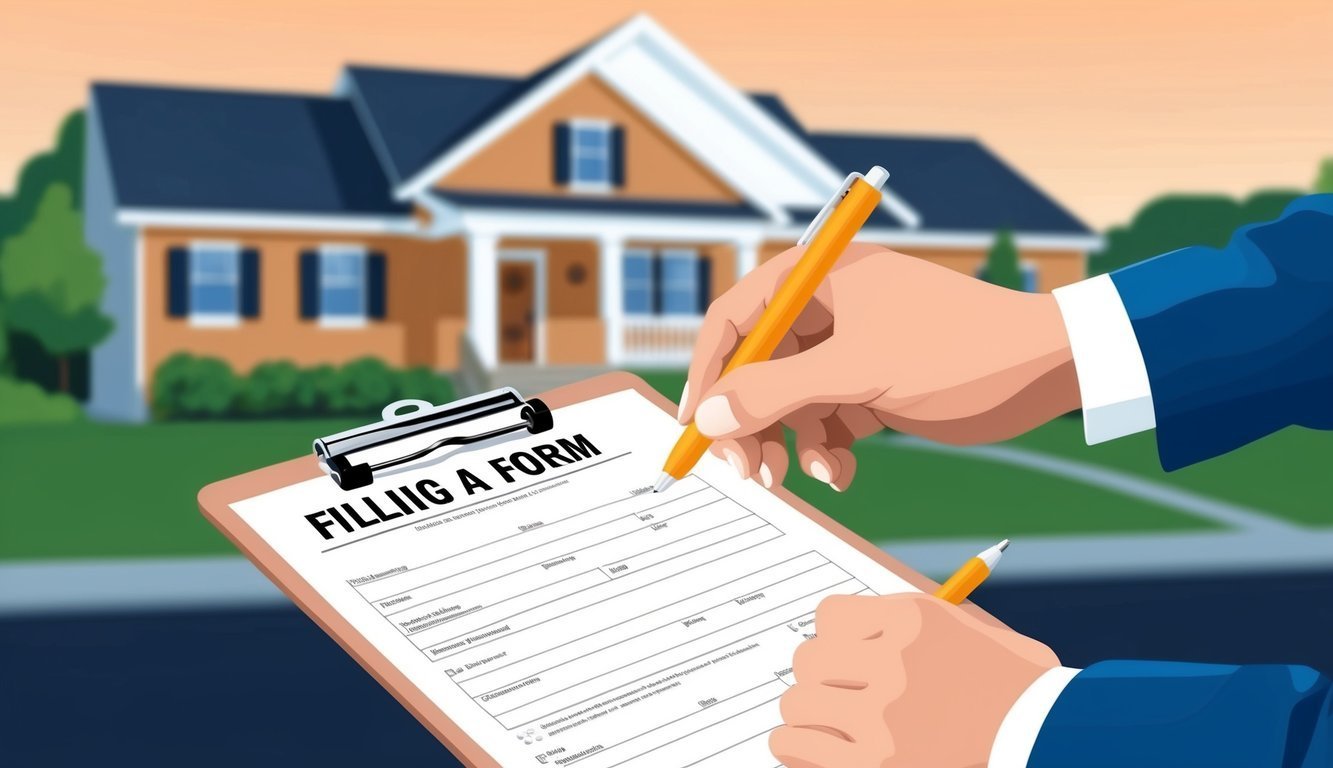Thinking about jumping into a career as a home inspector? It’s a fantastic choice! You get to help folks make informed decisions on what’s likely their biggest investment—their home.
And guess what? Getting started isn’t as tricky as it may sound.
To kick things off in home inspection, start by checking what your state requires.
You’ll need to complete any necessary training, then gear up for the National Home Inspector Examination. Many states rely on this exam for licensing, and it typically costs around $225.
But hey, don’t worry! It covers the essential skills you’ll need to excel in this job.
Before diving into the exam, you might want to finish a few training courses.
These will give you the lowdown on building systems, safety concerns, and inspection techniques.
Once you feel ready, you can sign up for the test online or over the phone through either PSI or Pearson-VUE testing centers.
Easy peasy!
Key Takeaways
- Check your state’s requirements and finish the needed training before you become a home inspector.
- Pass the National Home Inspector Examination to tick the licensing box.
- Grow your skills by gaining hands-on experience and staying sharp with industry standards.
Getting Started with Home Inspections
Starting out as a home inspector involves getting to know the ropes, securing your license, and diving into proper training.
These steps are crucial to becoming a skilled inspector that people trust.
Understanding the Profession
Home inspectors play a crucial role in real estate dealings.
They comb through houses, checking for issues that buyers need to know about.
It’s a job that requires a sharp eye and a solid understanding of how homes function.
A typical day might look like this:
- Inspecting 1-2 houses
- Writing up detailed reports
- Chatting with clients about what they find
You’ve got to be comfortable:
- Climbing ladders
- Crawling into tight nooks
- Dealing with hot attics or chilly basements
It can be a fulfilling job! You help people make informed choices about their investments and can even be your own boss if you launch your own business.
Licensing and Certification
Most states want home inspectors to have a license.
The requirements can vary but usually include:
- Passing the National Home Inspector Examination (NHIE)
- Completing a specific number of training hours
- Having liability insurance
Even in states without licensing, getting certified is a smart move.
It tells clients you’re serious about your profession.
Groups like InterNACHI offer respected certifications that carry weight.
To maintain a license or certification, inspectors typically need to:
- Take continuing education classes
- Adhere to a code of ethics
- Pass periodic evaluations
Training and Education
A solid education is vital for new home inspectors.
It builds the foundation for spotting issues and explaining them in a way that makes sense.
You’ll find lots of learning options:
- Online courses: Flexible and often budget-friendly
- In-person classes: Perfect for hands-on practice with the tools
- Field training: Get real-world experience alongside pros
Some schools offer a combination approach.
Look for programs that focus on:
- Building systems and components
- Common defects and what causes them
- Report writing
- Business practices
InterNACHI’s “House of Horrors” is a cool training tool.
It’s a house intentionally built with defects, so students can practice spotting real problems in a controlled environment.
After the basics, many new inspectors opt for internships.
This is your chance to learn the ropes from seasoned pros before you take on clients solo.
Building Your Home Inspection Career

Starting a career in home inspection can be incredibly rewarding.
It takes skill, a bit of business savvy, and a commitment to ongoing learning.
Here’s a quick guide to help you build a successful home inspection business.
Starting Your Business
Getting your home inspection career off the ground takes a little planning.
First things first, check your state’s licensing requirements.
Many places will expect you to have specific training and pass exams.
Next, decide how you want to structure your business.
Will you be a solo act or build a team of inspectors? Drafting a business plan will help set you on the right path.
You’ll need the right tools and insurance.
Stocking up on inspection gear and getting liability coverage is a must.
Consider joining professional groups like InterNACHI for networking and added resources.
Don’t forget to set up a website and social media presence.
They’re essential for clients to find you.
Pick a catchy business name that sticks in people’s minds!
Marketing and Business Development
Marketing is crucial for growing your home inspection business.
Start by designing eye-catching business cards and flyers.
Network with real estate agents—they’re often the ones referring inspectors to buyers.
Attend local real estate events; you never know who you might meet!
Online marketing is a game changer too.
Share helpful home tips on social media, make short videos about common house issues, and do a little show-and-tell about your expertise.
Customer testimonials are worth their weight in gold—use them to build trust and showcase successful outcomes.
And don’t forget to share simple guides on how to sign up for housekeeping services so potential clients find it easy to connect with you.
Paid ads on Google or Facebook can be a quick way to get new clients.
Remember, happy customers are likely to leave glowing reviews, which helps build credibility with new clients.
Always aim for excellent customer service.
Be prompt in returning calls, and arrive on time for inspections.
Happy clients often lead to more referrals!
Continuing Education and Specialty Services
The home inspection field is always evolving. Staying current with continuing education is key.
Many states require ongoing training to keep your license up to date.
Expand your skillset to stand out! Adding services like radon testing or mold inspections can boost your income and attract more clients.
Joining professional organizations that offer training is a smart move too.
Many of these groups provide online courses and in-person workshops, plus special certifications.
Think about getting an all-access membership to a major inspection organization for marketing support and business tools.
Staying informed about building codes and new home technology will help you serve clients better and grow your business.
Frequently Asked Questions
Home inspections involve a few key steps and considerations.
Buyers should be aware of what they need to prep, the costs involved, common issues to watch for, and the timing for scheduling an inspection.
What should I prepare before scheduling a home inspection?
Start by jotting down any concerns you have about the property.
It’s also a plus to gather info about the home’s age and systems.
Make sure to clear access to all areas of the house.
This means removing clutter and ensuring the inspector can get to places like attics, crawl spaces, and mechanical systems.
Having utility records handy can be super helpful too.
How much does a typical home inspection cost?
Home inspection pricing can vary based on where you live and the size of the property.
Most inspections run between $300 and $500 for an average single-family home.
Bigger homes or those loaded with special features may come at a higher cost.
Some inspectors may add fees for extra services like radon or mold testing.
What are some common issues that can cause a house to fail an inspection?
Technically speaking, a house can’t “fail” an inspection.
Inspections are about reporting the condition.
But some issues are definitely more serious than others.
Common red flags include structural problems, roof damage, electrical hazards, and plumbing leaks.
Mold, pest infestations, and HVAC system failures are also warning signs to keep an eye on.
What’s the biggest red flag to look out for during a home inspection?
Water damage is usually a biggie.
It can lead to mold growth and structural issues.
Foundation problems are another cause for concern.
Buyers should stay attentive to signs of these issues—like cracks in walls, uneven floors, or musty smells that could indicate bigger problems lurking below the surface.
Is a license needed to perform home inspections in certain states, like California?
Licensing varies depending on the state.
In California, inspectors don’t need a license but must stick to state regulations.
Many states do require a license, though.
Buyers should be sure to check their state’s requirements and pick a skilled, experienced inspector.
How quickly can I schedule a home inspection once I make a request?
The timing of inspections largely depends on the availability of inspectors and the local real estate market.
Generally, buyers can expect to schedule an inspection within a few days to a week after making a request.
However, during busy seasons, it might take a little longer.
It’s smartest to schedule as soon as your offer is accepted!

